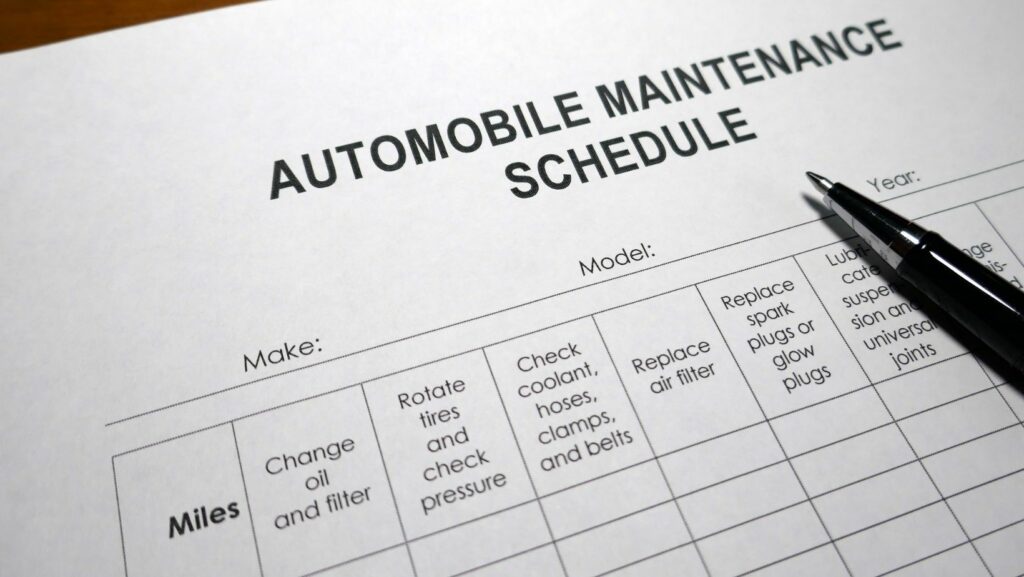Car Maintenance Schedule by Mileage or Time
Car Maintenance Schedule by Mileage or Time are crucial for ensuring a vehicle’s longevity and performance. By adhering to these schedules, drivers can avoid costly repairs and maintain their car’s resale value. There are two main types of car maintenance schedules: mileage-based and time-based.
Regular maintenance plays a vital role in keeping a car in top condition. It involves scheduling periodic services like oil changes, tire rotations, and brake inspections. These routine check-ups help prevent unexpected breakdowns and ensure the vehicle operates efficiently.
When deciding between mileage-based and time-based schedules, drivers should consider their driving habits. Mileage-based schedules are based on the number of miles driven and are suitable for frequent drivers. In contrast, time-based schedules are recommended for low-mileage drivers or vehicles that are not driven regularly. It’s essential to follow the manufacturer’s recommendations to determine the most suitable schedule for your car’s maintenance needs.
Key Mileage Milestones for Car Maintenance
Car Maintenance Schedule by Mileage or Time is crucial for avoiding expensive repairs and ensuring peak performance. Following a maintenance schedule based on mileage or time intervals is essential to prolong the lifespan of a vehicle and maintain its resale value. By adhering to recommended maintenance tasks like oil changes, tire rotations, and brake inspections, drivers can prevent breakdowns and keep their vehicles in optimal condition. It’s important to consider driving habits when choosing between mileage-based and time-based maintenance schedules to effectively address the vehicle’s maintenance requirements.
Performing an oil and filter change every 3,000–5,000 miles is vital to keep the engine running smoothly. Fresh oil lubricates the engine components, while a clean filter helps trap contaminants, ensuring optimal performance and longevity of the engine.
Replacing the air filter at 15,000 miles is essential for maintaining proper airflow to the engine. A clean air filter prevents dirt and debris from entering the engine, ensuring efficient combustion and performance.
At 30,000 miles, it’s crucial to inspect the brakes for wear and tear to ensure safe driving. Additionally, replacing the fuel filter helps maintain fuel system efficiency and prevents contaminants from affecting engine performance.
Checking the battery and coolant at 60,000 miles is important for ensuring proper functioning of the electrical system and engine cooling. A well-maintained battery and coolant system help prevent unexpected breakdowns.
Reaching 100,000 miles is a significant milestone that requires a comprehensive inspection and servicing of various vehicle components. This major service overview typically includes inspecting and replacing essential parts like timing belts, spark plugs, and transmission fluid to ensure the vehicle’s continued performance and reliability.
Time-Based Maintenance Tips
When it comes to time-based car maintenance, drivers should prioritize annual check-ups and considerations along with seasonal maintenance for vehicle longevity.
Drivers must schedule annual maintenance checks to ensure their vehicles are in prime condition. During these inspections, mechanics can assess the overall health of the car, identify any potential issues, and perform necessary repairs or adjustments. Additionally, drivers should consider factors like climate, driving conditions, and frequency of car use when planning their annual maintenance schedule.
Seasonal maintenance plays a crucial role in extending the lifespan of a vehicle. As the seasons change, different components of the car may be affected, such as the cooling system in summer or the battery in winter. By staying proactive and addressing seasonal maintenance tasks promptly, drivers can enhance their vehicle’s longevity and performance.
Car Maintenance Schedule by Mileage or Time is crucial for avoiding costly repairs and ensuring your vehicle operates at its best. By following a maintenance schedule based on mileage or time intervals, scheduling essential services, and considering your driving habits, you can prolong your car’s lifespan. Remember to adhere to key mileage milestones and time-based maintenance recommendations to keep your vehicle in top shape. Seasonal maintenance is also vital to prepare your car for changing weather conditions. Debunking common maintenance myths and following the manufacturer’s guidelines are essential for optimal performance and efficiency. Stay proactive with your car maintenance to enjoy a smooth and trouble-free driving experience.

